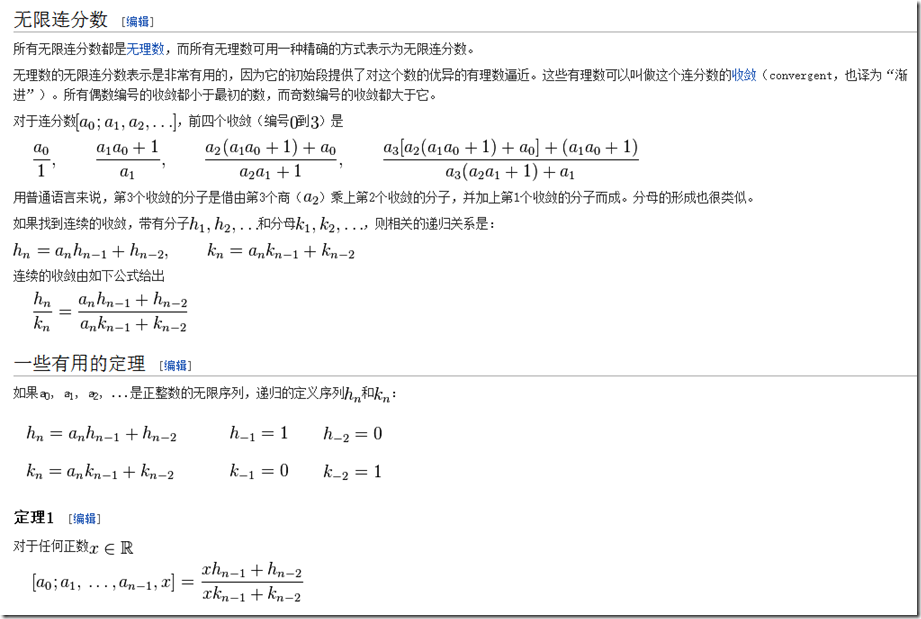现在做这个题目真是千万只草泥马在心中路过
这个与上面一题差不多
这个题目是求e的第100个分数表达式中分子的各位数之和
What is most surprising is that the important mathematical constant,
e = [2; 1,2,1, 1,4,1, 1,6,1 , ... , 1,2k,1, ...].
The first ten terms in the sequence of convergents for e are:
2, 3, 8/3, 11/4, 19/7, 87/32, 106/39, 193/71, 1264/465, 1457/536, ...
The sum of digits in the numerator of the 10th convergent is 1+4+5+7=17.
Find the sum of digits in the numerator of the 100th convergent of the continued fraction for e.
上面可以发现一个规律
维基百科链接:连分数,上面有递推公式
这么多就足够解题了,
上面的定理1,用不到的
e = [2; 1,2,1, 1,4,1, 1,6,1 , ... , 1,2k,1, ...].
a0=2
下面的:1,2,1,1,4,1,1,6,1,这个规律很明显
根据上面的规律
Java代码:
package project61; import java.math.BigInteger; public class P65{ void run(){ BigInteger d = new BigInteger("1"); BigInteger n = new BigInteger("2"); for(int i= 2;i<=100;i++){ BigInteger temp = d; long c = (i%3==0)?2*(i/3):1; BigInteger BigC = new BigInteger(c+""); d = n; n = d.multiply(BigC).add(temp); } String toStr = n.toString(); int result = 0; for(int i=0;i<toStr.length();i++){ result += Integer.valueOf(toStr.charAt(i)+""); } System.out.println(toStr+"\nresult:"+result); } public static void main(String[] args){ long start = System.currentTimeMillis(); new P65().run(); long end = System.currentTimeMillis(); long time = end - start; System.out.println("run time:"+time/1000+"s"+time%1000+"ms"); } }
如果刚看到这一题的时候应该感觉这个数不是很大,然而分子是:6963524437876961749120273824619538346438023188214475670667
分子各位的数字和是:272,要用BigInteger类型
Python程序:
import time as time def mysum(num): return sum(map(int,str(num))) def getA(i): if i%3==0: return 2*(i/3) else: return 1 def run(): h0 = 1 h1 = 2 for i in range(2,101): a = getA(i) h2 = a * h1 + h0 h0 = h1 h1 = h2 return mysum(h2) if __name__== '__main__': start = time.time() result = run() print "running time={0},result={1}".format((time.time()-start),result)
Python是根据上面截图中的写的
running time=0.0,result=272




